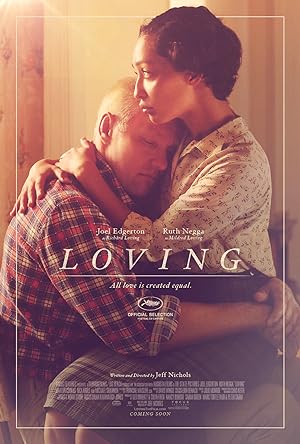Loving was must see viewing for me because it is one of the great moments in American legal history, and Jeff Nichols is one of America’s best living directors. Loving was the first Nichols film that I saw on the big screen, and it was worth the money, but those who missed its theatrical release should rectify that error by seeing it when it is available for home viewing.
Loving is the rare biographical and historical drama that does not feel like a member of this genre. Nichols’ Loving creates an understated movie about an ordinary couple that does what every couple does: gets married, prepares for their first baby, works and lives with their friends and family until suddenly the State invades their lives and sends them into a condemning tailspin that results in exile from this life. Loving wisely asserts that when the enforcement and legislative arms of the State see ordinary life as an act of civil disobedience, that is precisely when civil disobedience and legal remedies are needed.
Loving never loses sight of the fact that the Lovings are normal people, not activists trying to make some grand political gesture. Loving depicts why it is important that people get to live where they want-near their family, friends and personal history. Nichols, an Arkansas native, even convinced this city girl of their preference for their country roots as opposed to the confining necessity of city life.
Loving also felt like the culmination and perfection of all of Nichols’ previous work. Midnight Special feels like a first draft for Loving. Nichols finally is able to depict a heterosexual marriage without falling into antagonistic dynamic or only focusing on the husband. Loving depicts both male and female strengths in taking turns in leading. Usually male protagonists dominate Nichols’ films, and female characters are afterthoughts or have a faint whiff of trope. In Loving, the husband initially protects the family from this sudden intrusion, but faces a crisis in masculinity when he realizes that his abilities do not equal the State’s. Nichols makes a bold assertion: the real solution to a crisis in masculinity is not more masculine domination, but female support and strength.
If you are of the school of thought that white people can become honorary black people, for Richard Loving, it occurs when he is at work, and he suddenly does not know which of his longtime work colleagues to trust and becomes understandably paranoid. Joel Edgerton, who always does amazing work, really captures this turning point in Richard’s identity from an American who is entitled to live how he wants to a man under siege and in danger. As a black woman, she is used to being vulnerable and begins to lead the charge. Both Edgerton and Ruth Negga do masterful work with very little dialogue throughout the film, but from this point, Mildred becomes the focus of Loving as she strategizes how they can live, “Lose small battles and win the big war.”
If you are unfamiliar with Ruth Negga, then recognize that she is one of the finest actors of her generation. She has a face that harkens back to the era of silent film, but a timeless presence and strength that speaks to her nimble and deft manipulation of her tools-her tiny body and her distinctive voice. I became a fan of Negga’s after she appeared on Agents of S.H.I.E.L.D. for its first two seasons. Honestly her character, Raina/Flowers, was my favorite part of season one. She dominates any screen regardless of the size because she always gives the most interesting performance even next to an impressive titan of acting like Edgerton. I hope that filmmakers keep her busy for as long as she wants. I like Emma Stone, but the Academy Awards apparently cannot handle such unclassifiable and unique talent.
Michael Shannon, one of the few American actors in Loving and a staple of any Nichols film, gives a brief, but tender performance in Loving. For those familiar with the Loving story, you will not be surprised by the ACLU appearance. While not an explicitly political film, Loving feels very germane to our current political climate, and whenever I face doubts as to my inadequate ability to face these challenges, I am encouraged by how the ACLU attorneys enter the fray similarly outmatched yet remain victorious in claiming justice for those ordinary people victimized by the State.
Loving is must see viewing for those who like real love stories rooted in real life challenges and provides a beautiful lesson on how to live in a world that seeks to criminalize normal life.
Stay In The Know
Join my mailing list to get updates about recent reviews, upcoming speaking engagements, and film news.




